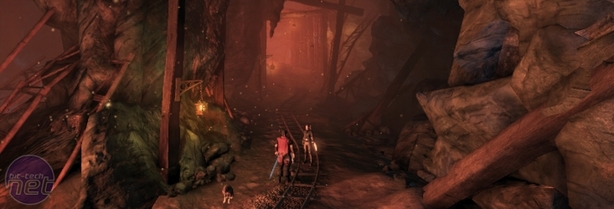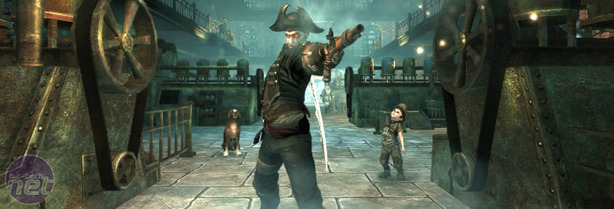
The Hero’s Journey
Molyneux then moved on to talk about how games tell stories and how they differ from films – a topic we’ve looked at recently here on bit-tech. Molyneux discussed the influential ‘Hero’s Journey’ theory which carries a lot of currency in Hollywood.The Hero’s Journey is based on the work of Joseph Campbell, who analysed a number of major myths from around the world, and concluded that they all shared the same master structure, where an everyman hero is compelled to leave his normal life and go on an adventurous journey to find fulfilment and bring balance back to the world.
It’s a fascinating theory and once you’ve got the gist of it, it’s extremely interesting to see how it’s applied in films – even in ones with chopped up narratives such as Pulp Fiction. Molyneux explained it very briefly, and then talked about how he wanted to engage with the Hero’s Journey in the next Fable game.
PM: Lot of films are constructed around the Hero’s Journey, and what I wanted to experiment with in Fable 3 was why not make half the game the Hero’s Journey – and the other half what happens next. This is unashamed promotion, I apologise. In Fable 3 you start off as a rebel, there’s a guy doing awful terrible things to the land of Albion, and you go on a path to take out this evil king, and become a king yourself.
Once you’ve done that, what do you do next? You can eliminate starvation or you can double it, you can empty the treasury or fill it with gold and rub it all over your body? Making your own rules is interesting because what we want is control and power over our lives and I think computer games can help us do that.
You’re a rebel and being this rebel, you need to get people to follow you, and they’ll do it if you promise to do certain things – you have to sign a piece of paper. One pledge, for instance, is to do with health, and you promise to stop this bad situation, but after you become King you realise you can’t keep all these promises because you only have a certain amount of gold in your treasury. So, it’s a case of which promises are most important to you.
FR: So, is there going to be a dog?
PM: The dog [in Fable 2] was there to give people something to care about. In so many games there’s nothing to care about or be emotionally involved with. So, we played the cheapest trick on you – a cute dog, with sad puppy eyes – and you know what, It really worked. At one point there were three women outside the [Lionhead] office with placards saying ‘do not kill the dog!’ So, it worked. We’re bringing the dog back, but it was too well behaved before – part of the fun of dogs is they misbehave and can be enormously embarrassing to the owner. The dog also ties into this new emotional connection in the game called touch.
FR: How does that work?
PM: We really want to tell a meaningful and deep story in Fable 3, so we have an amazing cast of actors – John Cleese, Stephen Fry – and some other huge names we’ll reveal later on, and that helps take us one step closer to this emotional story. It’s not just the craft and the pace that’s important, it’s giving people tangible things you can touch, and the dog helps here. It’s the ability to have your character reach out at any time and touch things. You can shake people’s hands, you can hug them, too.
We were inspired by the American man hug - although please don’t do it with British people, we find the closeness of the genitalia really frightening.

MSI MPG Velox 100R Chassis Review
October 14 2021 | 15:04











Want to comment? Please log in.